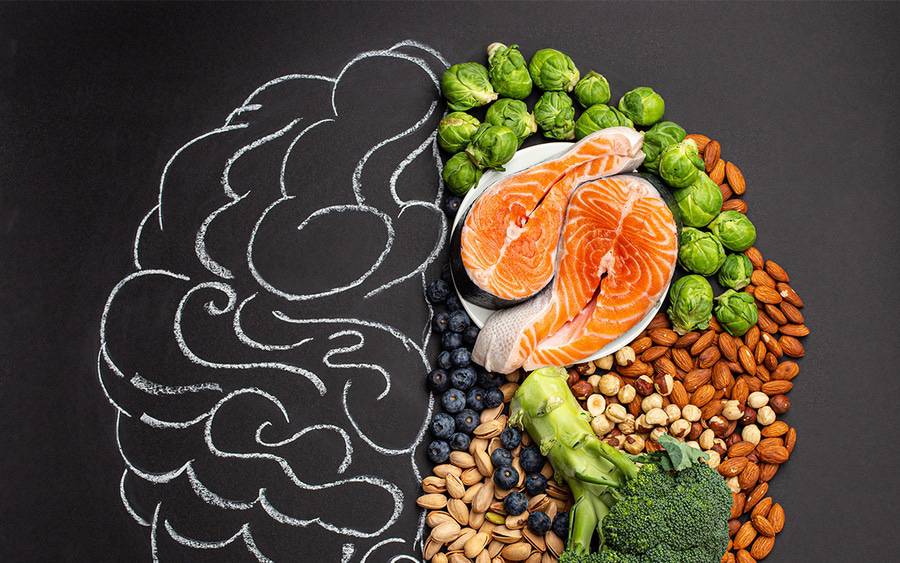What Are the Best Foods for Brain Health?
Mediterranean, DASH, MIND diets promote healthy brain foods

Mediterranean, DASH, MIND diets promote healthy brain foods
Eating healthy does more than boost your energy and help with weight management. It also plays a critical role in supporting your brain function.
“Your diet affects your whole body, especially your brain,” says Mary Kalafut, MD, a neurologist at Scripps Clinic. “A healthy diet allows the body to create new cells and generate the energy needed to function properly and fight disease.”
Many foods that support brain health also benefit heart health. These foods contain nutrients that reduce inflammation, a key risk factor for Alzheimer’s disease and other types of cognitive decline.
The Mediterranean, DASH and MIND diets are all excellent options. They’re low in unhealthy fats, cholesterol, sodium and added sugars, while rich in whole grains, fiber and lean proteins that nourish the brain.
“There is evidence suggesting a protective association between the MIND diet and dementia risk. This means focusing on diets that include whole foods, healthy fats and plant-based nutrients,” Dr. Kalafut says.
MIND stands for Mediterranean-DASH Intervention for Neurodegenerative Delay.
Best foods for brain function
Research shows certain foods can support cognitive performance and help protect against dementia, Alzheimer’s disease and brain fog:
- Fatty fish (salmon, sardines, mackerel): High in omega-3 fatty acids, which support brain cell structure communication
- Blueberries and dark chocolate: Rich in antioxidants, which may slow brain aging and improve memory
- Walnuts, seeds: Provide vitamin E and are good sources of plant-based omega-3 fatty acids
- Leafy greens (spinach, kale, collards): Packed with folate, vitamin K and beta carotene, nutrients linked to slower cognitive decline.
- Avocados: Contains monounsaturated fats that support healthy blood flow and help manage blood pressure, important for brain health
- Whole grains (brown rice, oatmeal, quinoa): Provide a steady release of glucose for brain energy
- Beans and legumes: Deliver complex carbs and plant protein to fuel brain function
Mediterranean and DASH diets
Eating brain-healthy foods is important but having a healthy eating plan is also essential. The Mediterranean and DASH (Dietary Approaches to Stop Hypertension) diets support heart and brain health.
Both diets focus on fruits and vegetables, whole grains and lean proteins like fish and poultry. They also include low-fat or non-fat dairy, olive oil and other healthy fats.
Both diets discourage red and processed meats, high-sodium foods, added sugars, sugary drinks and saturated and trans fats.
These eating plans help manage high blood pressure and cholesterol, which are risk factors for cognitive decline.
What is the MIND diet?
The MIND diet combines parts of the Mediterranean and DASH diets. This diet aims to improve brain health and lower the risk of Alzheimer’s disease.
MIND diet food groups include:
- Leafy greens and other vegetables
- Berries, especially blueberries
- Nuts
- Olive oil
- Whole grains
- Beans
- Poultry and fish
Healthy fats that support brain health
Not all fats are created equal. Healthy fats support brain cell membranes, reduce inflammation and improve communication between neurons.
Good fats to include:
- Monounsaturated and polyunsaturated fats (found in plant-based oils, nuts, seeds and fatty fish), can help improve memory, lower LDL (bad) cholesterol and raise HDL (good) cholesterol.
Bad fats to limit:
- Trans fats (found in many processed snacks, baked goods and fried foods)
- Saturated fats (in full fat- dairy products, butter and red meats)
“Bad fats raise the LDL cholesterol and increase the risk of heart disease, stroke and other chronic conditions,” Dr. Kalafut says. “Choosing healthy fats helps protect your brain and your heart.”
Tips to protect your brain long-term
Eating a brain-friendly diet is just one part of a healthy brain lifestyle. Daily habits and long-term choices also play a vital role:
Exercise regularly. It boosts blood flow to the brain and helps grow new brain cells.
Avoid smoking. It is linked to faster brain decline and a higher risk of dementia.
Get quality sleep. Deep sleep is essential for memory and repairing brain cells.
Stimulate your brain. Read, play games, learn new skills or do creative activities.
Stay socially connected. Meaningful interactions lower stress and improve emotional well-being. Both are important for brain function.